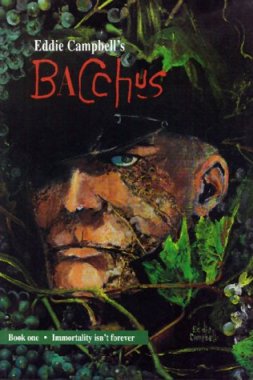| Bacchus:
Immortality Isn't Forever
I first read
Edith Hamilton's Mythology sometime around third or fourth
grade. My reading of it was a result of my mother's insistence
that I start reading books more up to my level, instead of the
many early reader books that I had been breezing through. In
a bookstore that has long since closed, she made me choose a
book from the grown-up shelves. As any child who is told what
to do would be, I was a nasty little bastard, threw a tantrum,
and eventually capitulated. Mythology was the book. And
I've loved that book ever since.
Stories
about heroes with massive strength and flying horses; love
stories in ancient Greece and upon the peaks of Mount Olympus;
the dalliances and dangers of a world full of gods; the book
covered everything that could be found exciting to a preteen.
For this reason, mythology has always been a patently interesting
topic to me, and has lead me to discover a bevy of further
interesting books, and many a comic.
Among
those comics is Eddie Campbell's Bacchus. You might
recognize the creator's name from the movie-adapted Alan Moore
comic From Hell, or also from the recent The Devil's
Footprints from Dark Horse Comics. Originally written
in the 1980s and collected in the mid-90s, Bacchus
is the story of the Greek god of wine himself (though, as
a point of order, I'm pretty sure that "Bacchus"
is the Romanized name of the Greek god "Dionysus").
It seems that he is one of the few surviving Olympians and
is looking none the better for his 4,000 years of age. Think
Clint Eastwood if he were a century or two older. It seems
that Bacchus has an ongoing feud with "Joe" Theseus,
the Greek hero of Athens who has survived the millennia in
a more or less youthful state, and that feud has escalated
as each Grecian attempts to have the other murdered.
The main
plot involving Bacchus and Theseus is a difficult one to follow,
as Campbell really just drops the reader into the story, with
little frame of reference. Even those schooled in mythology
will be lost as to the how and why of Bacchus' and Theseus'
mutual hatred, as there is no evident mythological reason
I can recall for these two to be enemies. Campbell does give
one reason for the hatred, involving a woman both men/gods
were attached to at one time, but the reasoning behind that
doesn't seem drastic enough to warrant the animosity between
the two characters.
Luckily,
while running through the modern day happenings of the God
of Wine, Campbell keeps taking the reader back in time, usually
through the narration of one of the characters, to Greece
to explain many complexities of the myths he's playing with.
He manages to explain the circumstances of Bacchus' birth,
Joe's ruthless nature, and various other myths with an easy
tone that somehow always fits the flow of the main plot. He
makes good transitions page to page and creates the atmosphere
of barroom stories when he tells them, in keeping with the
tone of the book.
The characters
themselves, though sparse in number, are fairly interesting
in their own right. Joe Thesus is a survivor to the core of
his being. He makes no apologies for this character trait
and cares little what others think about his eternally youthful
visage. Bacchus is an old letch and debaucher that longs for
the old days while still trying to make do with what the modern
world gives him. Even The Eyeball Kid (once you see him, you'll
know why) garners some decent characterization as Campbell
fleshes out his origins and the tragic nature of the character.
The bit players are throwaway characters that mean little
to nothing in the script, and their presence is somewhat distracting
to the story, save for the very strange Simpson, Bacchus'
lawyer, who finds some very strange, almost homoerotic places
to fit into the narrative.
The artwork,
also done by Campbell, is passable but not spectacular. His
line style is angular and his faces more often than not lack
emotion. He relies heavily on inks, as there is no color,
which at times creates a nice feeling of menace, but at others
just seems to blot out the artwork. I like his character designs:
Bacchus looks like a rundown longshoreman, while Joe appears
to be the reincarnation of Ernest Hemingway. Some of the artwork
dates the work as of the '80s, by the fashion and interior
decoration part of some scenes, but they can be ignored with
effort.
All in
all, Bacchus is interesting in concept, but nothing special
when it comes to execution. I'm not going to recommend it
as there are better ways to spend $9.95 in your local comic
shop, but if comics featuring Greek mythology is your thing,
Immortality Isn't Forever and the ten or so volumes
that follow it might be your particular type of scotch.
Book
1 - Immortality Isn't Forever (Eddie Campbell's Bacchus)
|






